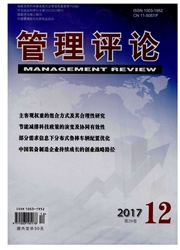

 中文摘要:
中文摘要:
基于中国创业活动迅速发展和创业活动分布非均衡性的客观实践,本文运用社会网络观,构建社会情境、职业地位与社会个体创业倾向的理论逻辑,采用北京地区社会个体的471个样本,实证研究社会情境、职业地位对社会个体创业倾向的影响。研究表明家庭情境、社会网络质量有利于提高社会个体的创业倾向;职业地位较高社会个体的创业倾向较低。本研究还进一步发现,职业地位显著调节社会情境与社会个体创业倾向的关系。本研究为构建社会个体与创业环境的联系建造了"桥梁",也为政府制定创业支持政策提供理论依据。
 英文摘要:
英文摘要:
Based on the practice of the rapid development of entrepreneurial activities and their non-equilibrium distribution in China, this study applies the social network perspective to establish the theoretical relationship among social context, occupational status and entrepreneurial intentions for social individuals, and uses the sample of 471 individuals in Beijing to empirically study the effect of social context as well as occupational status on entrepreneurial intentions for social individuals. The results indicate that the family context and the quality of social networks are beneficial to improve the entrepreneurial intentions for social individuals, and the individuals with high- er occupational status have lower entrepreneurial intentions. The study further shows that occupational status moderates the relationship between social context and entrepreneurial intentions for social individuals. This study has built the "bridge" to establish the linkage between social individuals and entrepreneurial environment, and also has provided the applications for government to make entrepreneurship-supporting policies.
 同期刊论文项目
同期刊论文项目
 同项目期刊论文
同项目期刊论文
 期刊信息
期刊信息
